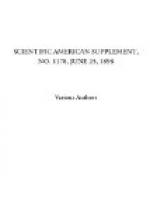It would, however, appear that all these various criteria which I have named are somewhat unsatisfactory. They do not, it appears to me, quite touch the question at issue. They are in a measure external measures altogether—even that somewhat psychological one which I quoted from the German authorities. Were I to propose a criterion, or a series of criteria, of culture which could be applied to all nations, it would be that which might as well and easily be applied to each individual; and when we come to apply it in that manner it is much more easy to understand its bearing. Herbert Spencer, in defining what he means by culture, says: “It means the knowledge of one thing thoroughly and a knowledge of the groundwork of all other branches of human knowledge.” He claimed that we can only understand one thing thoroughly; but that we could and ought to understand the general outline of all other things which are studied by mankind. This is somewhat defective, it appears, because it bases culture entirely from an intellectual point of view; and if man were merely a walking intellectual machine, it would be well enough; but he is not; for the intellectual man is but a small portion of his life. We are engaged, most of our time, in something which is very far from purely intellectual action. We are governed distinctly by our emotions and our feelings—our sentiments; and culture must touch them, or it is vague and empty. Therefore it is that I would say that we should think with Goethe—to whom we must often recur for an insight into the profoundest trends of human nature—must recur to him; and we find that he lays down the principle of culture in the individual to be “A general sympathy with all the highest ideas which have governed and are governing the human mind.” He said: “We should keep ourselves first (each man and woman should keep himself and herself) in touch with the highest elements of his and her own nature.” He said, “It is not so difficult, if we give but a little time to it—provided we give that time regularly. We must remember,” he says, “to cultivate our intellect by some study, every day and our sense of the beautiful by looking at something which is beautiful; and there is much around us which costs us nothing to look at were we to observe it—the cloud, the sunlight, the tree, the flower, a butterfly—anything of that kind studied for a few minutes each day would continue to develop in man’s mind the sense of the beautiful. We should also appreciate carefully our actions and govern them and measure them, as to whether they are just to others—a matter which a very few minutes a day will probably enable us to do;” and so also he would go further and seek to find, in the idea of truth itself, as to what we ought and ought not to believe—trying to discover some one test of truth which we can apply.




